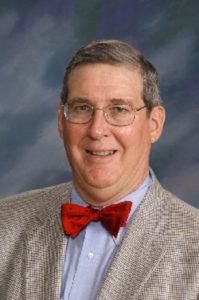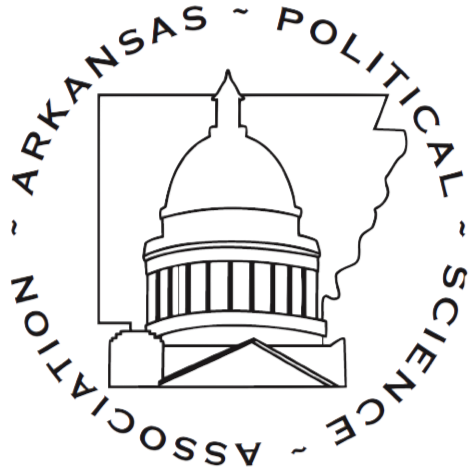
This is the second in a series of interviews with political scientists from around the state of Arkansas and members of our association. Every semester, we will release an interview with a different political scientist doing exceptional work. Today, we interview Dr. Hal Bass about the association, the discipline, Arkansas politics, and his career. Bass has been a member of the Arkansas Political Science Association for over 40 years, and is currently Professor Emeritus of Political Science at Ouachita Baptist University (in Arkadelphia, AR). He started teaching in 1976 at OBU, where he received campus-wide teaching awards in each of the five decades in which he taught. His teaching and research interests center on American politics, with a more specific focus on political parties and the presidency. He has authored numerous journal articles, book chapters, book reviews, and a historical dictionary on these topics. He is a former president of the Arkansas Political Science Association and the Southwestern Social Science Association. He received his undergraduate degree in Economics and Political Science from Baylor University in 1971, and his graduate degrees from Vanderbilt University in 1974 and 1978.
What motivated you to become a political scientist? What kind of teaching, scholarship, and service work did you hope to do in the discipline? Have you accomplished that work in your career?
I drifted into the discipline of political science as an undergraduate. I had always been interested in politics and government, but it never occurred to me to pursue it vocationally until about half-way through my undergraduate years. A political science professor encouraged me to consider graduate school. Having no more clear sense of direction, I decided to give it a try, and I have never had any regret for having done so.
Similarly, I drifted into the field of American politics. My initial interest was in political theory, more specifically, the history of political thought. Political theory continues to appeal to me, and I thoroughly enjoyed the opportunity to teach “Western Political Thought” for over two decades; but I soon became aware that the job market for theorists was bleak. More importantly, I was fascinated by the breaking Watergate scandals, leading me to reclassify myself within the discipline.
My graduate education prepared me better to proceed as a generalist than a specialist. I aspired to get a teaching position at a liberal arts-centered institution, and I was delighted to receive an offer from OBU. I hoped to be able to balance commitments to teaching and research, with an emphasis on the former, and that has proved to be the case. The norm of professional service was modeled for me and instilled in me in graduate school. My major professor, Avery Leiserson, served as president of the American Political Science Association, during my time at Vanderbilt.
How long have you been a member of the Arkansas Political Science Association? What compelled you to join?
I think I joined the ArkPSA in 1977. I guess I received a call for papers for the annual meeting. I looked forward to meeting colleagues here in Arkansas. Given the limited travel budgets that prevailed then and now, it made lots of sense to me to avail myself of a state-based association.
What was the first ArkPSA meeting that you went to? What year was it? Where was it at? Who was there? What scholarship or events were interesting at that meeting?
The 1978 annual meeting was held at nearby DeGray Lake State Park, and I volunteered to serve as a discussant on a political theory panel. I remember meeting George Zilbergeld (Arkansas College/Lyon), Conrad Waligorski (UAF), and Susan Power (ASU) at the panel session. I knew who Bob Savage was, from meetings of the Southwest Political Science Association, but I think I was first introduced to him there.
What offices have you held in ArkPSA? What did you learn and what did you accomplish from that service?
I served on the executive board (1985-87). I was designed by President Don Whistler to be program chair for the 1988 annual meeting, hosted by OBU. That led to my serving as vice president in 1989 and president in 1990. I should put an asterisk at the end of the last sentence. I was not formally elected president by vote of the membership. During our morning business meeting in Fayetteville in 1989, we got word that a major winter storm was heading our way. The room cleared immediately and we all headed home without finishing our business or the morning panels. I also served many years on the editorial boards of our journals.
I’ll leave it to others to evaluate my leadership accomplishments. I know my service provided me with significant learning opportunities. I believe that the position of program chair provides the incumbent with an invaluable opportunity to become familiar with scholarly trends and developments across the discipline. The only comparable experience I had was my preparation for preliminary exams in graduate school. Similarly, service on the editorial board, and more generally opportunities to review manuscripts for publication consideration is a great way to keep up with what’s going on in the discipline. Associational service also demands the development of capacities for collegial leadership.
What has ArkPSA accomplished while you have been a member?
We have modeled collegiality across the campuses throughout the state. Ours is certainly one of the more viable state associations in the nation. Very few state associations have found their way forward in ably serving the needs and interests of the faculties of both large graduate and small undergraduate institutions. We have provided a forum for the study of Arkansas politics throughout an era of profound transformation.
Did ArkPSA help facilitate research, teaching, and service collaboration; how so?
The annual meetings afford us with social and intellectual opportunities to get to know our colleagues across the state. Casual conversations can lead to conference papers, here and elsewhere, that in turn become publications. I am aware of numerous cross campus scholarly collaborations among our colleagues, and I firmly believe that the ArkPSA has been a key catalyst for these joint endeavors.
How has ArkPSA and Arkansas political science changed over the years?
Communications and information technologies have become much more advanced. Researching and writing papers has been facilitated by such innovations as word-processing and data analysis software, and on-line access to scholarly literature and bibliographical citations. The dramatic changes in the partisan landscape have challenged us to provide explanations and understandings. The community colleges play a larger role in higher education than they did in 1976. Tenure-track positions are in shorter supply and adjunct faculty slots are on the rise.
As someone who has attended many ArkPSA meetings, what keeps you coming back?
I continue to attend meetings for the camaraderie and the intellectual stimulation. I especially enjoy the opportunity to attend panels outside my field, something I rarely do at other professional meetings.
What does political science do well; what does it do poorly?
I think we have made great strides in providing our students with quantitative skills for data analysis. I think we have become more explicitly and intentionally comparative in our scholarship. I fear we have deemphasized the civic education dimension of the major.
Has your notion of political science shifted over the years? If so, how?
My early understanding of political science as a body of knowledge and methods for advancing that body of knowledge abides. I continue to see Political Science as informed by and reliant on other scholarly disciplines. I think that our connections with History have diminished, while those with other social sciences, eg., Psychology, Sociology, and Economics, have increased.
How does Arkansas politics compare with other states; it is similar; how has it changed over time?
Arkansas politics strikes me as much less idiosyncratic that It was when I came to the state, and it’s up to us as political scientists to make sense of the transformation that now finds Arkansas less distinctive. We have in a figurative sense, joined the union. This transformation has been generally limited to partisan labels. The underlying ideological and cultural norms that characterize the polity have featured more stability.
What do you hope for ArkPSA to accomplish in 10 years?
I hope we can do an even better job of enlisting participation by community college and adjunct faculty. I think we do better than most of our peers, but the changing landscape of higher education demands that we bring these colleagues into our fold. We need to socialize incoming faculty to the benefits of involvement with professional associations in general and ours in particular.
